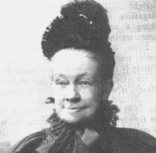Mary Colton

Annie Mary Colton (1822-1898), philanthropist and suffragist, was born in London on 6 December 1822, daughter of Hannah and Samuel Cutting. In 1839 she accompanied her widowed father to Adelaide; in December 1844 she married John Blackler Colton, owner of a prospering saddlery and hardware business. They lived at Hackney on 2 ha adjacent to Adelaide. Between 1848 and 1865 Mary bore nine children; several died in infancy.
A Wesleyan Methodist, she practised her faith unwaveringly, helping many in need, including 'shoals' who came to her door. 'Genial, pleasant, sunshiny', she was a devoted Sunday school teacher to generations of girls at the Gawler Place and later the Pirie St Wesleyan Methodist churches. Concerned for the welfare of women and children, she founded the Pirie St Dorcas Society, was vice-president of the Nursing Sisters' Association and treasurer of the Maternity Relief Association which assisted poor city mothers.
Ample domestic assistance enabled her to manage her elegant home and entertain generously; her husband was Adelaide's mayor (1874-75), a Member of Parliament (1862-87) and twice Premier. Mary worked with him in the Benevolent and Strangers' Friend Society and in organisations for the blind, deaf and dumb. All her life a city-dweller, she understood the situation of the poor and unprotected, and worked to house elderly women when she joined a cottage homes committee in 1871; later she was on the Lady Kintore Cottage Homes Trust, and the Home for Incurables committee. She assumed her many responsibilities without fuss. Never a figurehead but an assiduous worker, she shunned personal publicity.
In 1879, seeing problems which faced country girls in her large Sunday school class, she began a city club for young women; it was one of her dearest ventures. She also helped run a separate residential club for working girls from 1881. It lapsed, but through Mary's patient work her city club expanded, rented rooms, and in l884 became the South Australian Young Women's Christian Association, of which she remained president until her death. Under her care its social, educational and evangelistic departments flourished.
Aware of child illness and of the plight of unwanted children, she became one of the founders of the Adelaide Children's Hospital, opened in 1876, and worked on the Boarding-Out Society which placed orphaned and neglected children in selected private homes instead of state institutions. She continued similar tasks on the new State Children's Council from 1886.
Mary Colton's connection with the suffrage arose from her membership, from 1867, of the ladies' committee of the Female Refuge where she gained insight into the problems of single mothers and women seeking to escape from prostitution. Mary's husband, attempting legislation to protect young people, was president of the Social Purity Society which encouraged the Refuge ladies' committee to begin a Society branch in 1883. As its treasurer, Mary worked with forceful secretary Mary Lee (q.v.) to implement Social Purity aims. The age of consent was raised to sixteen in 1885, but seeking further improvements, Mary Colton and her colleagues began to recognise the urgent need for women's suffrage. Soon after Mary and her husband had sailed for a second and extended visit abroad, Social Purity Society members organised the South Australian Women's Suffrage League, in July 1888.
In 1892 her husband was appointed KCMG and in May of that year Lady Colton became Women's Suffrage League president. Using her knowledge of politics and politicians, her insight into women's inadequate social status and her customary friendly tact, she worked in harmony with Mary Lee. Their qualities and skills were complementary. Though she seldom made speeches, she acknowledged publicly and succinctly her commitment to women's suffrage. As a member of the Woman's Christian Temperance Union she facilitated the League's cooperation with the Union and thereby strengthened the suffrage campaign. She took on the additional post in 1893 of foundation president of the Women's Auxiliary of Foreign Missions.
After a campaign marked by extensive debate, strong opposition, and sustained and skilful League effort, women's suffrage legislation on terms equal to men's was passed in December 1894, to widespread public acclaim. Mary Colton and her husband had recently celebrated 50 years of marriage. She continued her round of work, ignoring fierce summer heat in 1897-98; her health suffered and she died on 28 July 1898. Her extraordinary range of work had helped shape South Australian institutions and improve women's status. Her name was given to the Lady Colton hall in the YWCA building and to Colton ward at the Adelaide Children's Hospital.
Helen Jones
